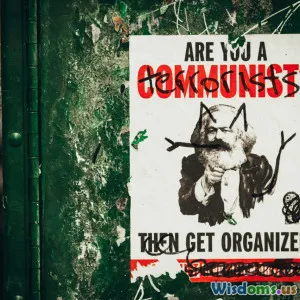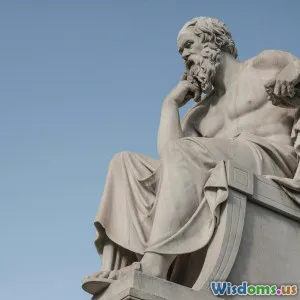
Is Privacy Dead in Today's Digital Landscape?
8 min read Explore the intricate relationship between privacy and spirituality in our digital age and discover if privacy truly is dead. (0 Reviews)
Is Privacy Dead in Today's Digital Landscape? A Spiritual and Philosophical Inquiry
Introduction
In a world where every click, swipe, and conversation might be tracked, shared, or analyzed, the phrase "privacy is dead" resonates louder than ever. But beyond the technology and laws, what does privacy mean to us as individuals? Is it merely a legal right or an intrinsic part of our spiritual and philosophical identity? This article explores the multifaceted truth of privacy amid the digital tsunami, asking: Is privacy really dead, or is it evolving into a new form that challenges our understanding of self and connection?
The Digital Landscape: A Privacy Paradox
The Extension and Exposure of the Self
Digital spaces intertwine with every facet of daily life—social media platforms document friendships, search engines map interests, and pervasive algorithms predict behavior. According to a 2023 Pew Research Center study, 81% of Americans feel the risks of data collection outweigh the benefits. The digital trail left behind often feels like a public archive of personal moments, raising questions on what boundaries still exist.
Yet, from a spiritual perspective, the "self" has always been a dynamic concept—an interplay of seen and unseen layers. The philosopher Søren Kierkegaard spoke of the self as a synthesis of varied elements, striving for authentic existence. Today's digital footprint challenges this authenticity: Are we oxidizing our true essence under the weight of permanent digital biography?
The Illusion of Control
Modern tech companies tout privacy controls—settings to limit data sharing or delete personal information. However, these controls are often complex or illusory. A study by Harvard's Berkman Klein Center (2024) revealed that only 11% of smartphone users effectively use privacy settings, suggesting that perceived control often masks reality.
From a philosophical angle, thinkers like Michel Foucault introduced the concept of the "panopticon"—a metaphor for societies where power resides in seemingly invisible surveillance. In digital spaces, this panoptic presence shapes how individuals self-regulate, often subconsciously altering behavior. Privacy, then, is less about freedom of information and more about autonomy over self-expression and being.
Privacy Through the Lens of Spirituality
The Sacredness of Inner Space
Across spiritual traditions, privacy is deeply tied to the sacred inner sanctuary—the place where the soul breathes free from external intrusion. In Hindu philosophy, Atman represents the true self beyond the physical and mental noise. Intrusion into personal data equates metaphorically to disturbances in this sacred psychic space.
Brené Brown, a renowned scholar on vulnerability, notes that "true belonging only happens when we present our authentic selves to the world." But digital life often nudges people towards curated selves, leading to spiritual dissonance.
Mindfulness and Digital Consumption
Practicing mindfulness can mitigate privacy loss by cultivating conscious awareness of digital engagement. Instead of passive data generation, mindfulness empowers individuals to make deliberate choices about when and how they share personal information. This aligns with Buddhist teachings that emphasize detachment from material and sensory cravings, reducing susceptibility to digital dependence.
Real-world applications include digital detox retreats and mindful tech use regimens, proving increasingly popular among those seeking balance. These practices echo ancient wisdom, suggesting a path where privacy is reclaimed not only externally but internally.
Philosophical Dimensions: Autonomy and Existential Integrity
Autonomy in a Connected World
Philosophers argue autonomy is central to human dignity. Without private spaces, autonomy erodes. Drawing on Immanuel Kant’s ethics, respecting individuals implies honoring their right to control personal information and self-identity.
Recent debates on legislation such as the European Union’s GDPR highlight the tension between collective benefits and individual privacy. While data sharing enables societal benefits like improved healthcare and urban planning, the loss of personal agency generates ethical concerns—parallel to the dilemma in communal versus individual rights examined by political philosophers.
Existential Risks of Total Transparency
Jean-Paul Sartre emphasized the importance of "the gaze of the Other" in shaping self-consciousness. In a digital age where surveillance is ubiquitous, this gaze becomes institutionalized. Constant transparency may lead to a 'performative existence,' where individuals become trapped in endless cycles of impression management, crippling authentic selfhood.
For example, whistleblowers such as Edward Snowden shed light on the extent of surveillance but also navigated complex existential challenges related to identity, exile, and conscience. Their experiences reveal the layered consequences of erased privacy.
Is Privacy Dead—or Reborn?
Privacy as a Shifting Paradigm
Rather than a tombstone marking privacy’s death, one could see the digital revolution as transforming privacy into a complex, multifaceted value. It now includes digital literacy, data sovereignty, and the ethics of sharing.
Emerging technologies, such as decentralized blockchain platforms, promise to return control to users by enabling encrypted, peer-to-peer interactions without central authorities. Simultaneously, philosophical conversations inspire new legal frameworks centered on human dignity in digital spaces.
A Call to Reconceptualize Privacy
The spiritual and philosophical implications challenge society to reconceptualize privacy not as mere secrecy, but as space for authenticity, reflection, and personal sovereignty. This echoes the ancient Platonic ideal of the "inner citadel," a stronghold of self beyond external encroachment.
Conclusion
Privacy in today's digital landscape is undeniably threatened, yet it is not unequivocally dead. Through spiritual introspection and philosophical inquiry, we uncover that privacy transcends data protection—it underpins our very essence and freedom to be.
Embracing mindfulness, advocating for ethical technology, and reimagining privacy as a sacred inner realm can help reclaim this core human value. In the dance between connectivity and solitude, perhaps our challenge is to reinforce the boundaries of the soul, crafting a future where privacy and presence coexist harmoniously.
As Mahatma Gandhi famously said, "The moment there is suspicion about a person's motives, everything he does becomes tainted." Today, safeguarding privacy means nurturing trust in oneself and the digital world alike.
Rate the Post
User Reviews
Popular Posts





















